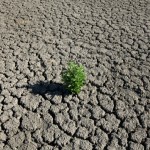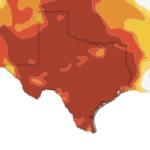For Texas Lawns, It’s Not Easy Staying Green (But It Is Possible)

Agrilife Research photo by Kay Ledbetter.
The pictured rotor head irrigation performed the worst in the drought-simulation study.
Drought doesn’t have to kill your lawn, say Texas A&M Agrilife researchers. Though it may appear brown, the grass can stay alive during water-restricted months. Researchers say it’s a matter of watering with the right sprinklers and the right techniques.
Texas A&M Agrilife researchers studied the best watering techniques during water restrictions by simulating drought-restrictions on grass. They used healthy plots of Bermuda and St. Augustine and limited their water intake to one-quarter inches and one-third inches of water twice a week. The researchers also tried out different sprinkler heads on the grass: spray, MP rotator, rotors and sub-surface drip.
According to the study, the drip irrigation sprinkler heads were the best at maximizing limited water supplies on grass. These sprinkler heads apply water slowly and directly to grass roots, although they are a little more labor intensive than other watering techniques.
Staggering water use on lawns can also help keep lawns alive.
“If you try to apply half an inch of water in a half hour, it can create quite a bit of runoff,” says Agrilife Senior Researcher James Thomas in the report.
Thomas recommends watering plants in slow cycles. Applying water to lawns, waiting for the water to soak in, and then watering more. This system eliminates water runoff that takes valuable nutrients away from the lawn and into the sidewalk.
The worst watering system? The rotor head performed the poorest in keeping lawns healthy with drought restrictions.
One thing the researches also emphasized in their study was that the lawns facing drought-restrictions need to start out in good shape in order to withstand the strained conditions.

